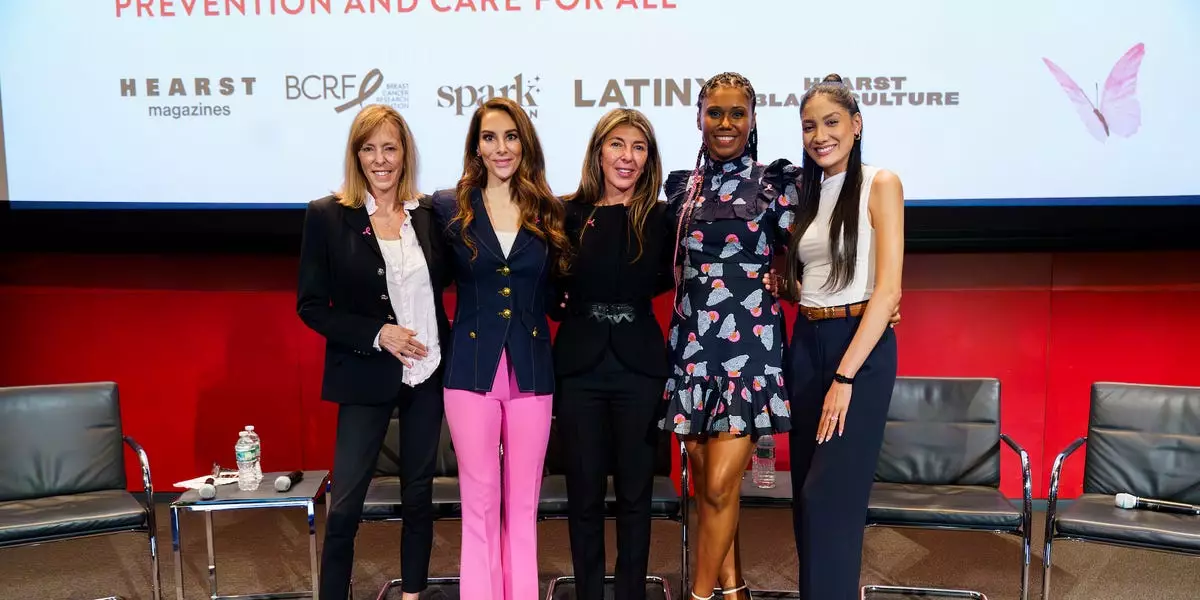October resonates with importance as Breast Cancer Awareness Month shines a light on the very real disparities and challenges faced in the battle against breast cancer. This year, Hearst forged a significant partnership with the Breast Cancer Research Foundation (BCRF) to host “United Against Breast Cancer: Prevention and Care for All,” a panel discussion designed to elevate personal narratives and expert insights. The session featured an inspiring group of panelists: Nina Garcia, ELLE’s editor-in-chief and a BCRF board member; actress Toks Olagundoye; advocate Rebecca Porter; and oncologist Dr. Elizabeth Comen. Their diverse backgrounds contributed to a rich dialogue about the intricate layers of breast cancer – from prevention and diagnosis to the vital need for support in treatment.
Moderator Lucy Kaylin, Hearst Magazines’ editorial director, began with a sobering overview of the health crisis, underscoring the alarming statistic that Black women are 40% more likely to die from breast cancer compared to other demographics. Furthermore, she highlighted the troubling incidence of young Hispanic women encountering breast cancer earlier in life and the challenges posed by the BRCA genetic mutations. Such statistics illuminate the critical need for awareness, education, and even more so, for urgent changes in healthcare practices.
The Unheard Voices: A Call for Change
Throughout the discussion, the panelists brought forth poignant experiences that expose a chilling truth—many women are often dismissed by healthcare professionals, relegating their concerns to mere anxiety rather than paramount health risks. Dr. Comen emphasized this ongoing issue, noting, “We need to change how women’s discomfort is perceived within the medical community.” The panelists, including Porter, shared personal stories that echoed this sentiment, fostering a bond of shared understanding and urgency.
Porter’s journey reflects the broader struggle of many women who sense something is amiss but face barriers to care, particularly in traditional healthcare settings. Despite her intuition, she found herself sidelined due to her youth and lack of family history. The need for an improved responsiveness from healthcare providers was a consistent theme, revealing flaws within a system tailored to the general population rather than attuned to individual experiences.
Such dismissals lay the groundwork for systemic biases that disproportionately affect women of color. The conversation reframed the narrative around breast cancer, highlighting that understanding, valuing, and listening to patients’ concerns can facilitate quicker diagnoses, appropriate interventions, and ultimately save lives.
An empowering message emerged from the discussion: the importance of self-awareness in one’s health journey. Porter ardently advocated for women to familiarize themselves with their bodies and engage in regular self-examinations. “Knowing what is normal for you is the strongest tool you have,” she insisted.
Dr. Comen echoed this sentiment, stressing that self-examinations can be the frontline defense in the detection of potential issues. Engaging in this act of self-care not only strengthens one’s understanding of their body but also distinguishes genuine concerns from benign changes.
The narrative shifted towards proactive health management, encouraging women to champion their own care. It was suggested that women pick a specific time each month to conduct self-exams, especially shortly after their menstrual cycle when breast tenderness is typically reduced. This method establishes a routine that can integrate easily into one’s life while fostering a mindset of vigilance.
A transformative aspect of the discussion was the shared experiences that underpin recovery and resilience. Garcia spoke candidly about her own struggles with the decision to undergo a preventative double mastectomy due to her BRCA mutation. The emotional burden she carried during this personal ordeal resonated profoundly with others present in the panel, paving the way for deeper connections.
Olagundoye’s narrative highlighted the often-unspoken fear of job loss while grappling with illness in a demanding profession. The support she received from colleagues contrasted with the stress she initially felt, showcasing the importance of a nurturing environment that prioritizes health over productivity. This dynamic between personal vulnerability and professional responsibilities raised essential questions about employer responsibilities and the need for compassion in workplaces.
Garcia described the extraordinary comfort that comes from building relationships with other women who have walked similar paths. Their shared sagas provided a sense of belonging that eased her fears and fortified her spirit. Such communal bonds not only dissolve feelings of isolation but create networks of support essential for navigating the complexities of breast cancer.
This engaging panel not only spotlighted critical discussions regarding breast cancer disparities but also urged a collective effort towards proactive dialogue, education, and communal support. The experiences shared by Garcia, Olagundoye, Porter, and Dr. Comen evoke a greater awareness that transformative change begins with hearing, respecting, and amplifying every woman’s voice within the healthcare narrative. Now more than ever, we must work collaboratively, advocating for systemic reforms and nurturing a culture where women’s health concerns are prioritized to ensure a healthier future for all.

